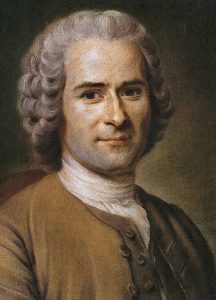Chapter One – Liberalism and Eurocentrism
Notes on Jean Jacques Rousseau

Life in Paris
Of modest origins, Rousseau was a composer who could not succeed in that field. Although still composing, he engaged in philosophy and received awards for his works. He became a best-selling banned author. The Social Contract and Emile sold very well, but caused major scandals. Both books were burned in public and Rousseau was sent into exile.
Later Days…
Banned, he nevertheless settled in the south of France in 1767, and was allowed to return to Paris in 1770. He became paranoid and spent his final days in seclusion, fearing the world in general and even his closest friends…
Influence
He died in 1778 just as the French Revolution was beginning. After his death, his ideas were taken up by the French liberal radical Jacobins, as well as employed by American philosophers/poets Ralph Waldo Emerson and Thoreau. Among his most ardent critics were his contemporary Voltaire and, much later, Karl Popper and Hannah Arendt.
Social Contract, basis of liberalism
- Concerned with the relationship of the state and the individual
- Believes that society is based upon some implicit contract
- The contract delivers us from “prior state of nature”
- The contract implies that the ruler is the people’s agent, not their master
- People empower the state by their contract with the ruler
- The citizens give the state (and society) complete control over themselves and their (individual) possessions
- People give up independent interest by giving up authority to the state to enforce the collective interest of society
- If the ruler or laws act other than in the interests of the whole of society, then the contract becomes void
- Rousseau is one of the thinkers to establish the philosophical foundations of liberalism, the political philosophy that guides Western democracies. See Main Elements of Liberalism in this book
State of Nature
- Before people lived in societies, their activities were largely dominated by unreflective pursuits of their own individual welfare
- The principle concern of people was self-preservation
- There were no rights or moral relations to be respected
- Cooperation was impossible
- In this environment, human character cannot develop, and people cannot rise above their base instincts
- Rousseau places non-Western people in the state of nature and refers to them as “savages.”
Liberalism, Gender oppression, Imperialism, and Eurocentrism
- The Social Contract left women more or less in the same subjugated position they had during Medieval Ages
- While Liberalism was progressive at the time in that it maintained that people were governed by themselves, and not by god appointed kings, it also claimed that BIPOC (Black and Indigenous People of Color) were less developed than Whites and in need of disciplining.
- Eurocentrism (See Notes on Eurocentrism in this book) is an ideology that supported the imperial actions of the European nations that ransacked resources in the “colonies” to enrich their own nations, and enslaved BIPOC for the profit of White plantation owners.
- Eurocentrism conveniently privileged the experience of White Europeans as superior to the practices of BIPOC. Rousseau’s “good savage,” was presented as in need of a helping hand to achieve full humanity through White civilizationary practices, which in many cases meant outright slaughter of millions of BIPOC throughout the non-Western world.
Media Attributions
- Jean Jacques Rousseau (painted_portrait) © Maurice Quentin de La Tour is licensed under a Public Domain license

